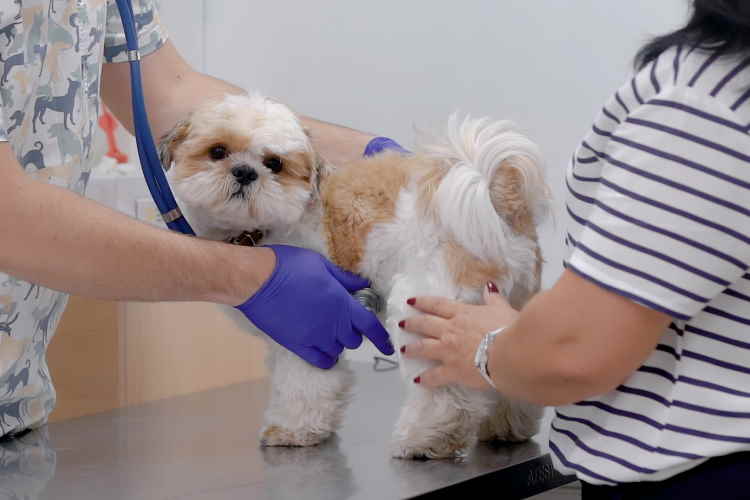When Is the Best Time to Spay or Neuter Your Shih Tzu?
BY MOLLY | EVERYTHINGSHIHTZU.COM | Updated 9-20-2023
This post may contain affiliate links. Read privacy & disclosure policy for info
If you're the proud parent of a new Shih Tzu puppy, then you undoubtedly are getting your fair share of cuddles and kisses.
Puppyhood is an enjoyable time, and puppies can be incredibly cute to watch. But, having a puppy isn't all fun and games; it also comes with a lot of responsibility.
One of the decisions you'll face early in your puppy's lifetime is spaying or neutering your Shih Tzu.

Most veterinarians recommend spaying or neutering a Shih Tzu dog when they are between 6 to 9 months old. However, it's more important to spay a female during this time frame than it is for a male dog, but generally, by the time the dog reaches puberty is considered ideal.
However, consult with your vet will assess the best time for your particular Shih Tzu to be spayed or neutered.
Often, when you adopt your pup from a shelter, they will more than likely already be spayed or neutered, as it's typically part of the shelter's program and policies.
Still, it's worth knowing the ins and outs, and if you need to make the decision yourself, do so under the guidance of your vet.
What Is the Best Age To Spay or Neuter Your Dog?
Spaying and neutering are often used interchangeably, yet they mean different things.
However, whether spayed or neutered, the outcome will be the same...your dog will be unable to produce puppies.
Spaying removes a female dog's uterus and ovaries through an incision made in the abdomen. Neutering is the removal of a male dog's testes.
So if you ask your vet to spay your male dog, you may get a funny look from your vet, but they will know what you mean.
Generally, vets recommend that you spay or neuter your dog between 6 and 9 months old, which is usually when they reach puberty. Although it could be earlier for some female dogs, most times it's before the first heat cycle.
However, neutering too early can carry several risks, especially when you're talking about small puppies and general anesthesia.
Yet, for females, waiting too long can also cause issues.
In larger breed dogs, waiting till the dog is older can also create more challenges with the actual surgery.
But typically, the surgery is done so often that it's pretty routine with few complication risks.
For a male Shih Tzu, many believe that waiting till your dog has reached puberty can lead to more health benefits.
But again, research is always ongoing and evolving, so stay updated when the time draws closer for you to make your decision.
Why Spay or Neuter Your Shih Tzu?

Are you on the fence about spaying or neutering your Shih Tzu? It's understandable; it's a big decision and, with any big decision, it's wise to get informed.
A good reason for spaying and neutering your pets is to help decrease the pet overpopulation problem.
The ASPCA estimates roughly 670,000 dogs are euthanized each year due to overpopulation in the shelters.
Around 3.3 million dogs come into animal shelters each year, and there simply isn't enough space or resources to care for them all.
This is one of the main reasons people advocate for spaying or neutering your pup -- to help keep the animal population from getting out of control.
But, it isn't the only reason.
When your female dog gets spayed, the ovaries and uterus are removed. When your male dog gets neutered, the testicles are removed.
These procedures can potentially lead to several benefits in regards to health as well as behavior.
Health Benefits of Spaying or Neutering Your Dog
One of the most significant advantages of spaying or neutering your dog is potentially reducing a dog's risk of several cancers and diseases.
Although research in this area is always ongoing, when your dog doesn't have their reproductive organs, it decreases the risk of cancer in these areas.
For example, a dog with no testicles won't likely develop testicular cancer.
Neutered male dogs can also experience less risk of perianal tumors and a reduced chance of getting an enlarged prostate.
In-tact females have a higher chance of getting various reproductive tract infections, like Pyometra. This is a nasty infection that can occur in dogs after they're in heat
Behavioral Benefits of Spaying or Neutering Your Dog
In addition to these health benefits, your dog (and you) are likely to experience some significant behavioral benefits.
For one thing, male dogs tend not to have as much of a desire to mark their territory (like on your favorite chair or new living room rug).
It can also potentially reduce aggression in dogs, but this can depend on the individual animal.
Both of these benefits can make multi-dog homes a bit calmer.
A big bonus is not having to deal with a female dog in heat or a male dog trying to get to every female dog in heat in the neighborhood.
A male dog is hardwired to seek out a female in heat, and they can usually sense it within three miles.
So while even a neutered male might still try to go after a female in heat, the chances are certainly reduced.
When a female goes into heat, it's not always the most pleasant experience; it makes a mess, and your dog acts differently.
She might even try to find ways to escape.
Getting your female dog spayed before her first cycle can prevent these types of situations.
Lifestyle Benefits of Spaying or Neutering Your Dog
When you spay or neuter your dog, you'll open up the doors, literally, to where your dog can go.
For example, many doggy daycares won't accept a dog that isn't spayed or neutered.
Training programs and boarding facilities also have strict guidelines and often charge more for in-tact dogs.
You might also save some money.
For example, you won't have to spend money on supplies to care for your female dog in heat (or damage caused by your sex-crazed male when he busts through things trying to breed with a female).
Plus, you won't have to foot the bill for your dog having puppies and then needing to pay for the care for those puppies
Cost of Spaying or Neutering a Dog in the United States
The cost of spaying or neutering a dog in the United States can vary widely depending on several factors, including:
- Location: The cost can vary significantly based on your geographic location. Veterinary services tend to be more expensive in urban areas and less expensive in rural areas.
- Size and Breed of the Dog: Larger dogs may require more anesthesia and surgical time, which can result in higher costs. Additionally, some breeds may have unique considerations that affect the cost.
- Age of the Dog: Spaying or neutering a younger dog is often less expensive and has fewer complications than doing it on an older dog.
- Veterinary Clinic or Hospital: The prices may differ between veterinary clinics and hospitals. Hospitals often have higher overhead costs, which can translate to higher prices.
- Additional Services: Some veterinary clinics may offer package deals that include vaccinations, post-operative pain medications, and follow-up appointments. These can affect the overall cost.
On average, the cost of spaying, a more complicated surgery, ranges from $50 to $500 or more in the United States.
The price varies depending on the weight of the dog, local rates, and whether the pet is in heat or pregnant.
Neutering, on the other hand, is less complicated and might cost between $35 and $250 and up. However, these costs can increase if complications arise or additional services are needed.
Remember, it's essential to consider all the factors that might influence the cost, not just the basic price of the procedure.
This includes pre-surgical blood work, pain medication, and post-operative care.
While it might seem like a significant initial expense, spaying or neutering your Shih Tzu is a one-time cost that can lead to substantial savings down the line by preventing health issues and unwanted litters.
Reasons Some Don't Spay or Neuter Their Dogs

Although many people with companion animals opt to spay and neuter their pets, there are also many who decide not to.
Breeders, obviously, leave their dogs intact for breeding purposes.
Others look at it from a moral standpoint, believing people don't have the right to do that to an animal.
There are also a few myths floating around that keep some people from neutering their pups, including that neutering will lead to obesity.
Also, some people believe that letting a female have one litter of puppies is beneficial to her overall health.
These reasons are largely unfounded, and as far as worrying about obesity, it's all about how you care for your dog long term.
As long as you provide your dog with ample opportunities to exercise and feed them a nutritious diet, it shouldn't be a problem.
Ultimately, the decision to spay or neuter your Shih Tzu is yours, and you should carefully consider all of the sides.
However, if you decide to move forward, ensure you talk with your vet about the best timeframe for your dog, as every pup is unique.
Frequently Asked Questions: Spaying or Neutering a Dog
Is it ever too late to spay or neuter a dog?
Is it ever too late to spay or neuter a dog?
While younger dogs often recover more quickly from the procedure, most vets agree that, for the health benefits it offers, it's never too late to spay or neuter a dog.
Remember that these answers are typical responses and may not be suitable for every dog. Always consult with your vet for advice tailored to your pet's specific needs.
Will my dog still be protective of our home after neutering?
Will my dog still be protective of our home after neutering?
Yes, your dog will still be protective of your home after neutering. Their instinct to protect their pack and territory is not solely driven by hormones but also by their natural temperament and training.
Will neutering cause my dog to be less active or playful?
Will neutering cause my dog to be less active or playful?
Neutering should not affect your dog's energy levels or playfulness. Maintaining regular exercise and mental stimulation will keep your dog active and playful.
How long will it take for my dog to recover after the procedure?
How long will it take for my dog to recover after the procedure?
Recovery time can vary, but generally, most dogs will recover within two weeks of the procedure. During this time, it's important to limit your dog's activity and follow the post-operative care instructions provided by your vet.
Does pet insurance cover the cost of spaying and neutering a dog?
Does pet insurance cover the cost of spaying and neutering a dog?
Pet insurance typically does not cover the cost of spaying or neutering your pet. Spaying and neutering are considered routine preventive procedures, and most pet insurance policies focus on covering unexpected illnesses, injuries, and accidents.
Can I still breed my dog after neutering?
Can I still breed my dog after neutering?
No, neutering removes the ability of a dog to reproduce. If you are considering breeding your dog, discuss this with your vet before deciding to neuter.
Is spaying or neutering an option for dogs with behavioral issues?
Is spaying or neutering an option for dogs with behavioral issues?
Neutering is not a cure-all for behavioral issues. While it can help reduce some behaviors influenced by hormones, it is not a substitute for proper training and behavior modification strategies.
Does spaying or neutering change a dog's personality?
Does spaying or neutering change a dog's personality?
Spaying or neutering your dog will not change their core personality or their ability to learn, play, work or hunt. Some behaviors may be reduced after neutering, but the individual personality of your dog is a product of training and care, not hormones.
What should I feed my dog after spaying or neutering?
What should I feed my dog after spaying or neutering?
Your vet will likely recommend feeding your dog a normal diet. If your dog doesn't have an appetite initially, try offering small amounts of bland food.
If you still have unanswered questions about spaying or neutering your Shih Tzu, feel free to ask us here.



